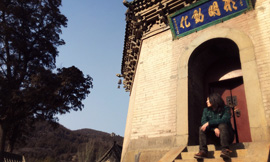
Jinyang, the ancient name of Taiyuan city, was founded two thousand and five hundred years ago, developed over the Spring and Autumn Period of five dynasties, peaked in the Tang Dynasty, and was burned down over 3 days in the Song Dynasty. Fortunately, the posterities have unearthed historical relics and sites, among which were manyBuddhist temples. lt has since been dubbed Chinas ancient city of Pompeii. The composer grew up with influences of Buddhism and Taoism. The acquisition of local natural sounds, the clear and pure female voice with plain male voice, and drum from local villages, all combines to shape the Jinyang city that blurs space and time. With the unique characteristics of world music, the composer divides the work into three parts, that is, Cultivate Oneself, Release Souls from Purgatory, and See All Sentient Beings. It outlines the old image of the ups and downs of human civilization. Zhang ZhiweiZhang Zhiwei, an independent composer and game sound designer, is graduated from Shanxi Normal University. He created and led the first domestic major of sound design in Beijing Contemporary Music Academy in 2010. He has a world music band ‘Liang Ren(Beloved). He seeks inspirations from the western classical and modern music, opera, kunqu opera, martial arts, literature and ancient Chinese poems.
Music
2014